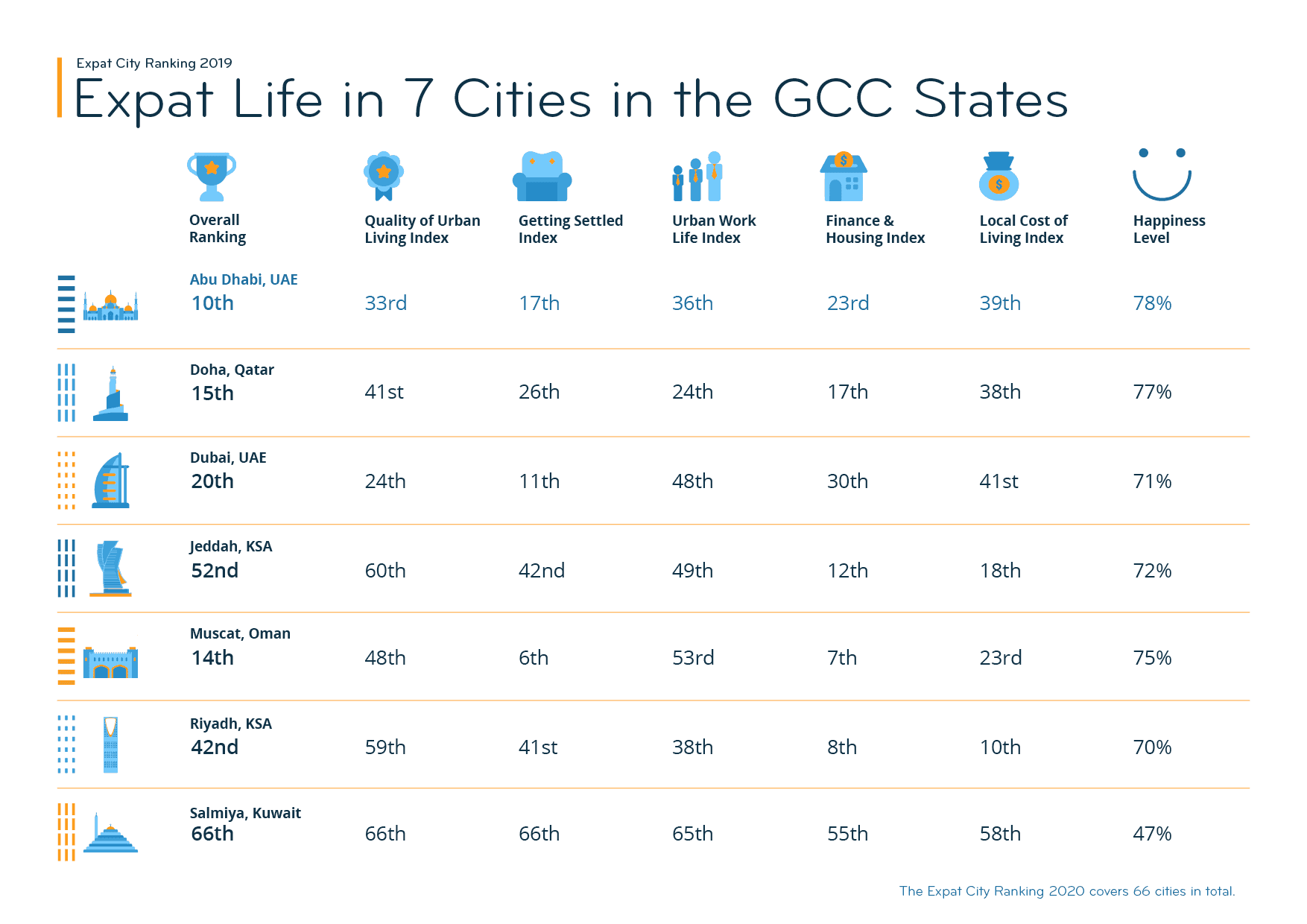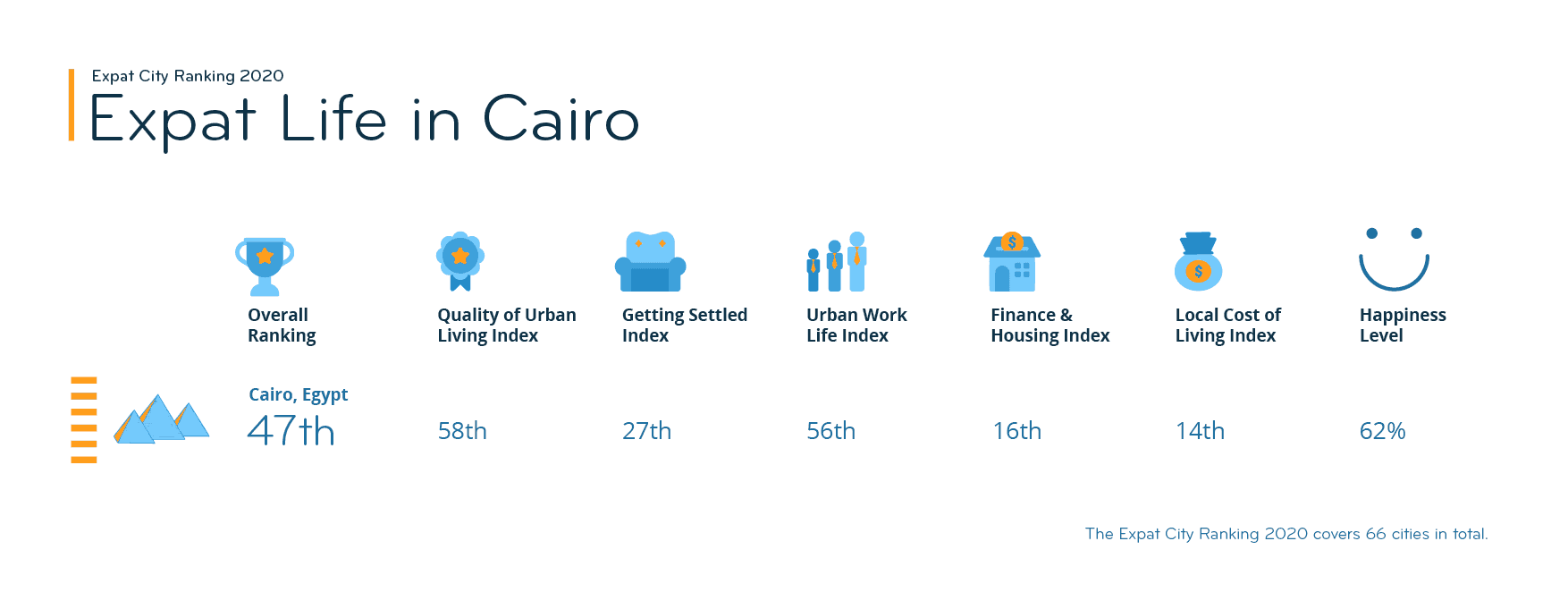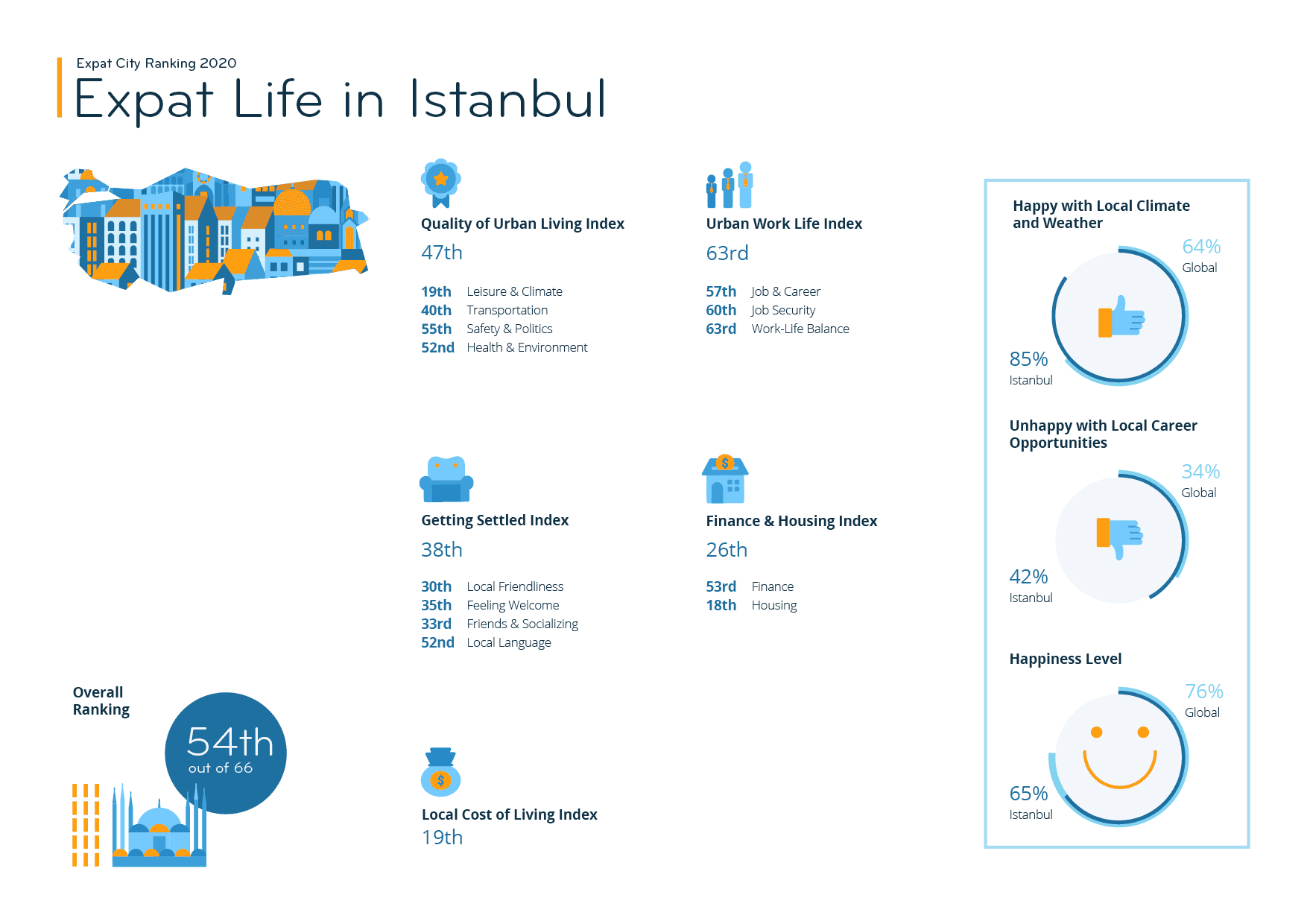Cities in the Middle East
In 2020, nine Middle Eastern cities have enough respondents to qualify for the Expat City Ranking: seven cities in GCC States are joined by Cairo and Istanbul.

10. Abu Dhabi, UAE
Among the Middle Eastern destinations in the Expat City Ranking 2020, Abu Dhabi is the best-rated one, ranking 10th out of 66. It performs especially well in the Getting Settled Index (17th). Expats in Abu Dhabi do not only find it easy to live there without speaking the local language (93% vs. 54% globally), but they also consider it easy to make new friends (57% vs. 47% worldwide). Moreover, they describe the local population as both friendly in general (17th) and friendly towards foreign residents in particular (16th).
The Finance & Housing Index (23rd) is Abu Dhabi’s second-biggest strength. While 70% say it is easy to find housing (vs. 55% globally), only 28% find it affordable (vs. 41% globally). Nonetheless, 63% are satisfied with their financial situation, about the same as the global average (61%).
The city’s results in the Quality of Urban Living (33rd) and Urban Work Life (36th) Indices are just about average. Abu Dhabi benefits from the easy availability of healthcare (10th) and the high degree of personal safety (6th) — 78% of expats feel completely safe there (vs. 45% globally). However, only 50% are happy with the local climate and weather (vs. 64% globally).
In terms of working in Abu Dhabi, expats are dissatisfied with their job security (47th), their working hours (51st), and their work-life balance (52nd). “I dislike my very busy working schedule and not having the time to socialize with my friends,” says an expat from Uganda.
14. Muscat, Oman
Ranking 14th out of 66 cities, the Omani capital boasts some excellent results in the Getting Settled (6th) and Finance & Housing (7th) Indices. In the Local Friendliness subcategory, Muscat even comes first worldwide: 82% are happy with the general friendliness of its residents (vs. 68% globally), and 89% appreciate the friendly attitude towards expats (vs. 66% worldwide). “I love the warmth and the hospitality,” says an expat from India. No wonder that 77% of the respondents feel at home in Muscat (vs. 64% globally).
Expats also find it easy to find a literal home in Muscat: 76% rate this factor positively (vs. 55% worldwide), and 53% describe housing as affordable (vs. 41% globally). While the respondents are not as satisfied with the general cost of living (23rd), they are still happy enough with their disposable household income: 63% say that it is more than what they need to cover expenses (vs. 51% globally).
However, the income seems to be hard earned. Muscat only ranks 53rd in the Urban Work Life Index. Expats worry about their job security (64th) and local career opportunities (59th). Two in five (40%) are unhappy with the latter (vs. 34% globally), for example.
Lastly, Muscat ranks low in the Quality of Urban Living Index (48th). Nearly one in four expats (24%) complain about the lack of leisure options (vs. 15% globally). Moreover, they are unhappy with the public transportation system (56th) and the availability of healthcare (42nd). On the bright side, 96% feel safe in Muscat (vs. 82% globally).
15. Doha, Qatar
In the Expat City Ranking 2020, Doha lands in a favorable 15th place out of 66 expat destinations. The Qatari capital gets its best result in the Finance & Housing Index (17th). Around two out of three expats (66%) are happy with their financial situation (vs. 61% globally). While housing is easy to find (73% positive ratings vs. 55% globally), just 25% describe it as affordable (vs. 41% worldwide).
Doha also does better than the global average in both the Urban Work Life (24th) and the Getting Settled (26th) Indices. Nearly seven in ten expats (68%) are generally satisfied with their job (vs. 65% worldwide); however, their satisfaction with local career opportunities is just about average (42% happy vs. 43% globally). When it comes to getting settled in Doha, 92% of expats appreciate how easy it is to live there without speaking the local language (vs. 54% globally). But only 58% find it easy to get used to the local culture, just below the global average (61%).
The Quality of Urban Living Index (41st) yields the most disappointing results. Doha does very well for some factors, such as the quality of healthcare (9th) and personal safety (14th). However, expats do not always enjoy local life that much: 31% are unhappy with the climate and weather (vs. 20% worldwide), and about one in five (21%) dislike the lack of leisure options (vs. 15% globally). “I really miss cultural activities, such as theater, ballet, etc.,” states a Turkish expat.
20. Dubai, UAE
Dubai ranks 20th out of 66 in the Expat City Ranking 2020. In the Getting Settled Index (11th), the city is even the number one for the ease of living abroad without local language skills. Maybe this is one reason why expats are happy with their social life in Dubai (69% vs. 59% globally) and consider it easy to make friends (61% vs. 47% worldwide).
Dubai also performs better than average in the Quality of Urban Living Index (24th). Respondents consider it the third-safest city worldwide, after Tokyo (1st) and Singapore (2nd). “I feel really comfortable here,” says a Chinese expat woman. And unlike in other Middle Eastern destinations, expats seem happy with the leisure options (84% vs. 71% globally), too. However, 29% are unhappy with the affordability of healthcare (vs. 21% globally).
Affordability seems to be a touchy subject in general, with the city ranking 30th in the Finance & Housing Index. This is mainly due to the Housing subcategory (13th), whereas Dubai ends up among the bottom 10 for finance (62nd): 30% of expats are not satisfied with their financial situation (vs. 21% globally), and 32% say their disposable household income is not enough to cover expenses (vs. 21% worldwide). Another 54% consider the cost of living too high (vs. 36% globally), ranking Dubai 41st for the latter.
In the Urban Work Life Index, Dubai merely comes 48th. Nearly one in four expats (23%) are unhappy with their working hours (vs. 17% worldwide). They are also dissatisfied with their jobs in general (53rd) and their lack of job security (62nd).
42. Riyadh, Saudi Arabia
Riyadh ranks 42nd out of 66 cities in the Expat City Ranking, with its best result in the Finance & Housing Index (8th). Expats in Riyadh appreciate the affordable housing (8th) and are happy with their financial situation (9th). Three in five (60%) even state that their disposable household income is more than what they need to cover expenses (vs. 51% globally). Another 52% rate the local cost of living positively (vs. 46% worldwide).
Careerwise, they are not quite as satisfied, ranking the city 38th in the Urban Work Life Index. Their overall job satisfaction (32nd), as well as their satisfaction with local career options (29th), is a little above the global average. However, many do not consider their jobs secure (34% negative responses vs. 22% worldwide) and are unhappy with their work-life balance (28% vs. 18% globally).
Riyadh ranks even worse in the Getting Settled Index (41st). Respondents find it challenging to get used to the local culture: only 45% of expats rate this factor positively (vs. 61% worldwide), and 31% do not feel at home in Riyadh (vs. 21% globally).
In the Quality of Urban Living Index, Riyadh even ends up among the bottom 10 (59th). It does particularly badly in both the Leisure & Climate (65th) and the Transportation (63rd) subcategories. Just 49% rate the local leisure options positively (vs. 71% globally), and 57% criticize the public transportation infrastructure (vs. 24% worldwide). “I hate that I am totally reliant on my car,” says an expat from Australia.

47. Cairo, Egypt
Cairo comes in 47th place out of 66 cities in the Expat City Ranking 2020, which is mainly due to its poor results in the Quality of Urban Living Index (58th) and the Urban Work Life Index (56th). The city ranks particularly low for its urban environment (65th), only ahead of Bangkok (Thailand), with 63% of expats rating this factor negatively (vs. 21% globally). What is more, expats are unhappy with the public transportation system (58th) and the local leisure options (59th). In fact, 20% rate the latter negatively (vs. 15% globally). When it comes to the Urban Work Life Index, job security seems to be an issue in Cairo. The city ranks 58th in this subcategory, and 39% of expats are unhappy with the local economy (vs. 18% globally).
On the other hand, Cairo performs well in the Finance & Housing Index (16th) and the Local Cost of Living Index (14th). According to a British survey respondent, there is “good quality of housing”; in fact, 46% of expats find housing affordable (vs. 41% globally), while 56% say that it is easy to find (vs. 55% globally). Lastly, Cairo comes 27th in the Getting Settled Index and even lands among the top 10 worldwide for the general friendliness of local people towards foreign residents (8th). Exactly three out of four respondents (75%) describe them as friendly towards expats (vs. 66% globally), with an expat from Romania pointing out: “The people are kind!”
52. Jeddah, Saudi Arabia
Jeddah’s strengths and weaknesses are similar to those of Riyadh, the other Saudi Arabian city in the Expat City Ranking 2020. However, coming 52nd out of 66 cities, Jeddah ranks ten places lower. Like Riyadh, Jeddah offers affordable housing (only 17% unhappy vs. 41% globally), and expats are satisfied with their disposable household income: 85% say it is enough or more than enough to cover expenses (vs. 79% worldwide).
However, Jeddah does a lot worse in the Getting Settled Index (42nd). Expats find it difficult to get used to Jeddah’s local culture (59th out of 66). While 67% describe the locals as friendly (vs. 68% globally), only 36% find it easy to make friends (vs. 47% globally). Moreover, just 44% are happy with their social life (vs. 59% worldwide).
In the Urban Work Life Index (49th), expats’ overall job satisfaction (43rd) and the satisfaction with local career opportunities (45th) are both low. What is more, they are unhappy with the lack of job security (30% negative ratings vs. 22% globally), and only 48% rate their work-life balance positively (vs. 64% worldwide).
Similar to Riyadh, the Quality of Urban Living Index (60th) is Jeddah’s weakest point. Healthcare-related factors — such as its availability (19th) — are the only ones for which Jeddah performs well. Expats dislike the urban environment (62nd), the transportation system (64th), and the local leisure options (65th). An expat woman from New Zealand is very unhappy with the restrictions: “I can’t even simply go outside for a run! The opportunities to be active are limited.”

54. Istanbul, Turkey
Out of the 66 destinations surveyed in the Expat City Ranking 2020, Istanbul ranks 54th overall. Performing especially badly in the Urban Work Life Index (63rd), the city ends up among the bottom 10 in the Job Security subcategory (60th). In fact, four in nine expats (44%) are not satisfied with the state of the local economy, which is 26 percentage points more than the global average (18%). Istanbul also does poorly in the Job & Career subcategory (57th), with 42% of expats rating their local career opportunities negatively (vs. 34% globally). Just about half the expats living in Istanbul (51%) are satisfied with their jobs in general (vs. 65% globally), while 36% do not like their working hours (vs. 17% globally). A Moroccan expat in Istanbul shares: “People work way too much here, and they expect everyone to do so.”
Istanbul also receives poor results in the Quality of Urban Living Index (47th), with more than one in three expats (36%) rating the urban environment negatively (vs. 21% globally). On top of that, Istanbul comes in the lower half of the ranking for the availability of healthcare (43rd) and personal safety (47th), as well as local leisure options and the public transportation system (40th for both).
Turkey’s largest city performs better in the Finance & Housing Index (26th). It only ranks 53rd for finance, however, while coming in 18th place for housing. While an above average proportion of expats are not satisfied with their financial situation (28% vs. 21% globally), many think that housing is affordable (49% vs. 41% globally). A Lebanese expat mentions “the cheap life” as an upside of relocating to Istanbul — and half of the respondents (50%) seem to agree with this statement, rating the local cost of living positively (vs. 46% globally). In fact, Istanbul ranks highest in the Local Cost of Living Index (19th).
66. Salmiya, Kuwait
Salmiya is the worst-rated destination in the Expat City Ranking 2020 (66th out of 66). It places last in two indices and ends up among the bottom 10 in every single index but one. “What I don’t like about local life? Oh, so many things — I could go on for hours!”, as an expat from Australia puts it.
In the Quality of Urban Living Index (66th), Salmiya’s only redeeming aspect seems to be the Safety & Politics subcategory (47th). However, expats in Salmiya are unhappy with the local transportation (61st), with their health and the environment (66th), as well as with climate and leisure (66th). Nearly three in five (56%) dislike the local leisure options, for example (vs. 15% worldwide).
In the Getting Settled Index (66th), expats do not feel at home (54% vs. 21% globally), they describe the local population as unfriendly (48% vs. 17% globally), and they are unhappy with their social life (56% vs. 24% globally).
The city’s losing streak also continues in the Urban Work Life Index (65th), where it features among the global bottom 10 in all subcategories: Job & Career (64th), Work-Life Balance (64th), and Job Security (59th). For example, expats in Salmiya are the least happy with their work-life balance worldwide (41% unhappy vs. 18% globally).
Things are looking up a little in the Finance & Housing Index (55th). However, even for its best-ranking factor in this index — the ease of finding housing — Salmiya still places 44th out of 66.
Further Reading
- Best & Worst Cities for Expats in 2020
- Quality of Urban Living Index 2020
- Getting Settled Index 2020
- Urban Work Life Index 2020
- Finance & Housing Index 2020
- Expats in Abu Dhabi
- Expats in Muscat
- Expats in Doha
- Expats in Dubai
- Expats in Riyadh
- Expats in Cairo
- Expats in Jeddah
- Expats in Istanbul
- Expats in Salmiya
Advertisement
Join InterNations
The community for expats worldwide
Download

